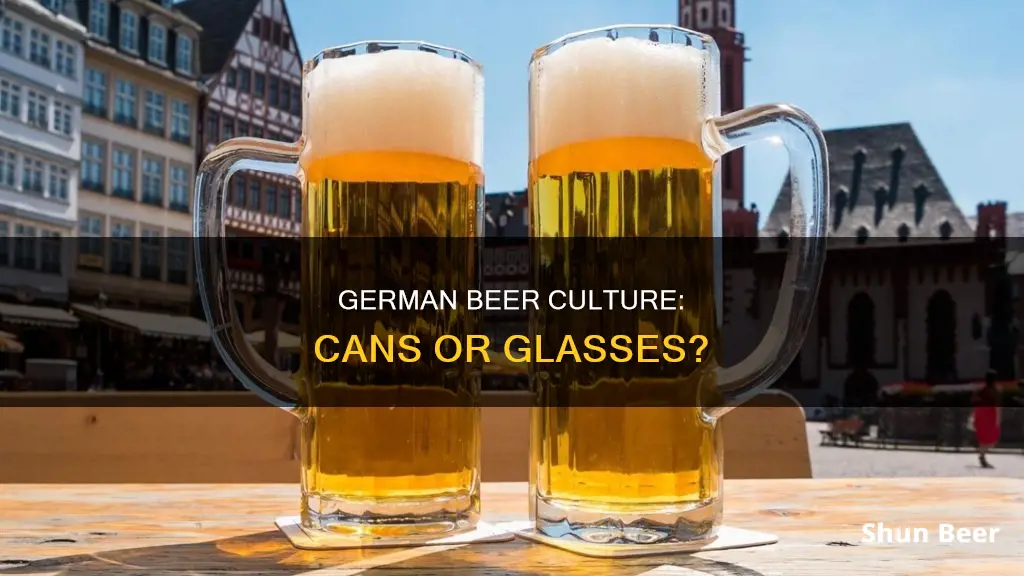
Germany is famous for its love of beer, but do Germans drink it from cans? In short, yes, but it's not the most popular way to drink beer in Germany. In fact, drinking beer from a can is often considered uncouth in the country. Beer bottles are preferred, and Germans will even recycle them to get their deposit back. However, cans do have some advantages, such as being better for the beer as no light or oxygen can get in, and they're easier when it comes to logistics. So, while Germans may not be the biggest fans of drinking beer from cans, it's not unheard of for them to do so.
| Characteristics | Values |
|---|---|
| Drinking beer out of cans in Germany | Considered uncouth |
| Beer cans in Germany | Make up only 7% of the German beer market |
| Beer bottles in Germany | Preferred by customers, seen as more civilized |
What You'll Learn

Drinking beer from cans is considered uncouth in Germany
In Germany, drinking beer is common and important, and the country is well known for its favourite beverage. However, drinking beer from cans is often considered uncouth in Germany. While beer is available in cans, it is not the preferred choice for Germans, who tend to favour drinking beer from glass bottles.
The preference for bottles over cans is deeply rooted in German culture and traditions. Germans take great pride in their beer, and the country has a long history of brewing excellence. With over 5,000 different types of beer produced in approximately 1,500 breweries across the country, beer is an integral part of German culture and social life.
One of the main reasons why drinking beer from cans is frowned upon in Germany is the belief that it affects the taste of the beer. Germans believe that drinking beer from a glass bottle is "much more civilized" and that cans are "ergonomically wrong". They believe that beer from a can warms up too quickly and that the can itself looks "cheap and a bit trashy".
In addition to taste and aesthetics, there are also environmental concerns associated with beer cans in Germany. While recyclable cans do exist and make up a small percentage of the market, there is a misconception that they are environmentally unfriendly. This is despite the fact that beer cans in Germany carry a deposit, just like bottles, and are recyclable.
The preference for glass bottles over cans is so strong in Germany that it has led to a unique problem for the country's beer industry. In 2018, Germany faced a beer bottle shortage as breweries struggled to keep up with demand due to customers not returning their empty bottles quickly enough. This issue highlighted the importance of glass bottles in the German beer culture, as well as the reluctance to switch to alternative packaging, such as cans.
While drinking beer from cans may be convenient and common in other parts of the world, it is clear that in Germany, it is considered uncouth and not in line with the country's rich beer traditions and preferences.
Beer and Loratadine: Safe Mix or Health Risk?
You may want to see also

Beer is Germany's favourite alcoholic beverage
Beer is an important part of German culture and is drunk regularly. In fact, in some parts of Bavaria, a special type of malted brew called hefeweizen is enjoyed for breakfast. Beer is also considered a healthy end-of-work drink, and it is common to see workers with a bottle or can of beer in hand walking home or riding the bus.
While beer is a beloved drink in Germany, drinking it out of a can is often considered uncouth. Germans prefer to drink beer out of glass bottles or the proper glassware for the specific type of beer. For example, Weizenbier, Weißbeer, or Hefeweizen must be drunk from a special high glass that is narrow at the bottom and wide at the top, allowing the yeast to spread and improve the taste.
The German love for beer is even reflected in the language. Germans use the phrase "something is brewing" to mean that a storm is coming or that trouble is in the air. When a situation is truly hopeless, one might hear the expression "hops and malt are lost."
Beer and Hepatitis B: What You Need to Know
You may want to see also

Beer is an important part of German culture
Beer is so integral to German culture that it even has its own language. Germans often say "something is brewing" to indicate that a storm is coming or that trouble is afoot. When a situation is beyond saving, you might hear "hops and malt are lost", meaning it's hopeless.
The German Purity Law, dating back to 1516, is the oldest consumer protection law in the world. It dictates that beer should contain only water, malt, hops and yeast, and is taken very seriously by German brewers. This law was introduced when beer was used as a substitute for water, which was often contaminated.
Drinking is a common and important part of German culture, with the so-called "Feierabendbier" (end-of-work beer) a vivid tradition. It is legal to drink in public, and you will often see people with a bottle or can of beer on their way home from work or on public transport.
While drinking is important to the culture, so is responsible consumption. Germans are encouraged to opt for low-alcohol or alcohol-free beers, and to keep track of their alcohol intake.
Beer Left Out: Is It Still Safe to Drink?
You may want to see also

The German Purity Law ensures only certain ingredients are used in beer
In Germany, beer is an important part of the culture, with drinking taking place regularly. In fact, in the past, it was not uncommon for Germans to drink the equivalent of 50 cans of beer in a day. While this number may seem staggering, it is important to note that the average ABV of German beer at the time was around 4%, which is similar to a light beer today.
When it comes to the ingredients used in beer, Germany has a long history of regulation through the German Purity Law, also known as Reinheitsgebot. This series of regulations limits the ingredients that can be used in beer production. The original law was enacted in Bavaria in 1516 by Duke Wilhelm IV and stipulated that only water, barley, and hops could be used as key ingredients. The role of yeast in brewing was not yet fully understood at the time, but it was later added as an important fourth ingredient when its significance in achieving fermentation was recognised in the 19th century.
The German Purity Law was introduced to prevent brewers from using unsavoury and dangerous ingredients that could compromise the quality and safety of the beer. It also played a role in ensuring the availability of affordable bread by restricting the use of wheat and rye to baking, as well as suppressing the use of plants associated with pagan rituals. While the law has undergone revisions and exceptions have been made for certain regional styles, it continues to be a foundation of quality for many German brewers even today.
The law has had a significant influence on brewing not only in Germany but also worldwide. It is considered a part of Germany's national identity, with 85% of Germans supporting it and deeming it worthy of protection. The law stands for transparency, clarity, and purity in the brewing process, prohibiting the use of artificial additives and preservatives. While some critics argue that it restricts creativity, others believe it fosters innovation and mastery of the brewing craft using natural ingredients.
In conclusion, the German Purity Law has played a crucial role in shaping the country's beer culture by ensuring the use of specific ingredients, maintaining quality and safety standards, and influencing brewing traditions both within Germany and beyond.
Beer and Rum: Mixing Alcohol Safely
You may want to see also

Beer drinking is common in public in Germany
Beer drinking is an important part of German culture and is enjoyed regularly. It is not uncommon for Germans to drink beer in public, and the so-called "Feierabendbier" (end-of-work beer) is a vivid part of the German beer and working culture. It is legal to drink alcohol in public in Germany, and people can often be seen walking home or riding the bus with a can or bottle of beer in hand. However, it is important to note that consuming alcohol on some public trains or buses is prohibited.
In Germany, the legal drinking age varies depending on the type of alcoholic beverage. For beer and wine, individuals can legally purchase and consume these drinks at 16 years old, with parental supervision from the age of 14. For distilled spirits, the minimum age rises to 18. This differentiation acknowledges the cultural acceptance of beer as a lighter alcoholic drink and part of social life for younger adults.
Beer drinking in Germany is regulated by strict rules and traditions. For example, it is considered sacrilegious to drink a "Weizenbier" out of the bottle. Instead, it must be consumed from a special high glass, narrow at the bottom and wide at the top, to allow the yeast to spread and improve the taste. Toasting is also an important part of German drinking culture, and Germans tend to toast frequently, in various situations.
While Germans love their beer, the most popular drink in the country is actually mineral water.
Freezing Beer: Is It Safe to Drink After?
You may want to see also
Frequently asked questions
Yes, but it is not common. In Germany, drinking beer out of a can is often considered uncouth. Beer cans only make up 7% of the German beer market, which is otherwise dominated by bottles.
Germans consider drinking beer from a bottle to be more "civilised". One German resident said that drinking from a can is "ergonomically wrong" and that the beer "warms up too quickly".
Some Germans believe that beer cans are environmentally unfriendly, but this is a misconception. Cans are recyclable and are often returned to stores in exchange for a deposit, just like bottles.
Cans only make up 7% of the German beer market.
Drinking beer in Germany is common and important, and it is legal to drink in public. It is also very common to see workers with a can or bottle of beer walking home or riding the bus.







